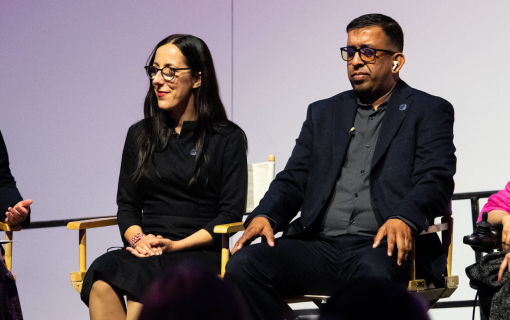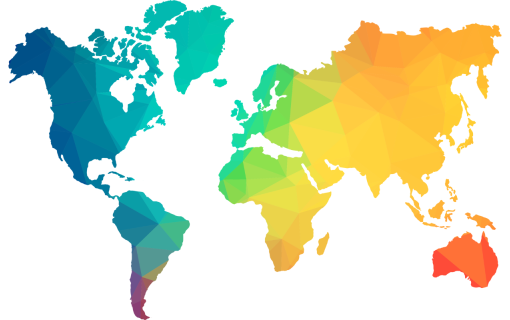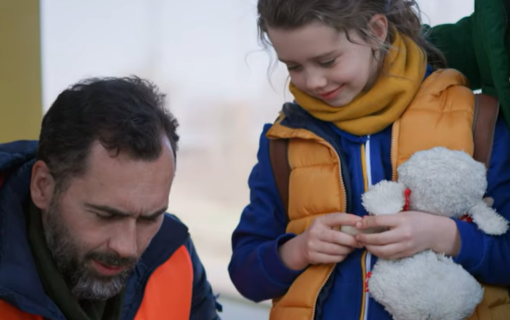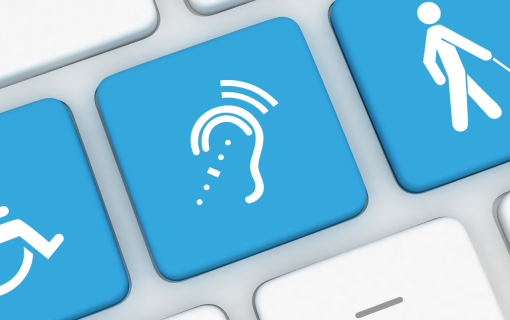Establishing a Partnership Between Disability Organizations and the Ghana Electoral Commission
Briefing Paper Series
Vol. II, No. 1
May 2001
Establishing a Partnership Between Disability Organizations
and the Ghana Electoral Commission;
Identifying Next Steps to Promote Electoral Access in Ghana
Executive Summary
On Thursday, March 8, 2001, two non-governmental organizations from Ghana -- Action on Disability and Development and the Federation of Disability Associations (FODA) -- convened a seminar to discuss the participation of citizens with disabilities in the December 2000 Presidential and Parliamentary Elections in Ghana.
Participating in the seminar were senior officials of the Ghana Electoral Commission, members of FODA, representatives of ADD/Ghana, representatives of the International Foundation for Election Systems, and two disability advocates from Sierra Leone.
As a result of the seminar, the Ghana Electoral Commission and the Ghanaian disability organizations agreed to establish a seven-person committee to develop recommendations for increasing electoral participation by people with disabilities, and promoting more accessible electoral practices in Ghana. This committee will look at issues such as voter education, voter registration, and the development of a ballot template for independent use by voters with visual impairments.
Background:
During the December 2000 Presidential and Parliamentary Elections, ADD and FODA identified, trained and deployed 77 Ghanaians with disabilities to serve as election observers. This was accomplished through a sub-grant from the International Foundation for Election Systems, under a program funded by the Swedish International Development Cooperation Agency (SIDA). As a result of the election observation effort, the disability organizations strengthened their ties to Ghana's Electoral Commission, as well as to the twenty-plus domestic civil society organizations which formed the Coalition of Domestic Election Observers (CODEO).
To follow-up the observation effort, ADD/Ghana organized a one-day conference in Accra to review lessons learned by the 77 ADD/FODA election observers, and to recommend next steps. The seminar was funded under a subgrant from IFES to Add/Ghana, as part of a program funded by the Ministry for Foreign Affairs of Finland.
The purpose of the seminar was to promote a dialogue and partnership among Ghanaian election authorities, representatives of organizations of and for people with disabilities, and others, so as to review lessons learned from the observation effort, to identify exemplary practices, and to identify barriers which prohibited the full participation of people with disabilities.
Seminar Participants
The Seminar was attended by 35 individuals, 24 of whom served as election observers from one of three national disability organizations which comprise the Federation of Disability Associations (FODA). These include members of the Ghana Association of the Blind (14), the Ghana Association of the Deaf (5), and the Ghana Association of the Physically Disabled (5). The seminar was also attended by two representatives of Action on Disability and Development.
Of these 24 election observers, 10 came from the capital Accra, and the other 14 came from Ghana's Northern, Upper Eastern, and Upper Western Regions.
Also in attendance was David Kangah, the Deputy Commissioner of the Ghana Electoral Commission, and two other senior election officials, Public Affairs Director Henry Okyne, and Public Affairs staffperson Anthony Ekpedzor.
The seminar was also attended by three IFES representatives, including IFES President Richard Soudriette, IFES Africa Region Program Officer Sue Palmer, and IFES Disability Expert Jerome Mindes.
Observing the seminar were two representatives of disability organizations from Sierra Leone. These individuals were in Accra en route to a conference in Nigeria of the African Blind Union. Their circumstantial attendance at the Ghana seminar was indeed fortunate, in that IFES will in May of 2001 provide technical assistance on disability issues to the Sierra Leone National Electoral Commission.
A complete list of participants is included as an attachment.
Seminar Structure and Overview
The seminar was organized as follows: opening statements; observations of election observers; working group sessions to discuss possible strategies to promote greater participation and electoral access for voters with disabilities; reports of the working groups; and closing statements on next steps. ADD Program Manager Thomas Issah moderated the seminar.
Opening Remarks
Nicholas Halm, the General-Secretary of the Federation of Disability Agencies in Ghana, provided the first opening remarks. Mr. Halm, who is blind, served as an election observer in Accra, and organized logistics and training for the 30 election observers who served in the greater Accra region. In his remarks, he likened the opportunity to observe the December 2000 elections to an early Christmas present to the disability community. He noted that it allowed citizens with disability to "show our capacity and potential," and that the experience helped the disability community in Ghana to "prepare to move forward to make participation in national life meaningful."
Mr. Halm noted that the experiences of most of the observers was positive - even though many were greeted with a sense of surprise that citizens with disabilities were serving as observers. For some observers and voters with mobility impairments, the physical accessibility of the polling station was a barrier to full participation. For observers with hearing impairments, a major problem was communications with other poll workers. Finally, he noted, some of the observers faced discrimination at the polling site.
However, Mr. Halm noted that the most troubling observation made was that so few citizens with disabilities seemed to actually go to the polls to vote. He suggested that disability organizations must play a more significant role in promoting voter education and voter registration for citizens with disabilities.
Overall, Mr. Halm stated that the disability community learned several things from participating in the observation effort: that people with disabilities are indeed capable of serving in this important role; that public education is necessary to overcome negative attitudes toward disability; that the collaboration between ADD and FODA was critical to moving into a new area of activity that is important to all; and that the Ghana Electoral Commission was very welcoming of the disability community and its election observers.
David Kangah, the Deputy Electoral Commissioner for Operations, was the second speaker. Mr. Kangah opened his remarks by reviewing the provisions of Ghana's constitution and election laws which pertain to voters with disabilities. He noted that it is "mandatory in this country for all citizens who qualify to have access to all the electoral processes without any hindrance." He added that "the Commission has in particular been conscious of the needs of citizens with disabilities and hence given them special attention in its public (voter) education programmes." Mr. Kangah displayed posters designed by the Commission that depict citizens with disabilities voting (a women in a wheelchair and a man using crutches). These posters were generally available throughout Ghana in the period leading up to the elections.
Mr. Kangah also noted that the election law provides for voters with disabilities who require assistance to "be assisted by a person of his or her own choice" and that voters "who are unable to go to the polling station personally can exercise their franchise by appointing a proxy…" Mr. Kangah acknowledged that provisions such as proxy and assisted voting are not entirely satisfactory, in that they are "highly trust dependent," and that they have indeed been abused.
In looking to the future, Mr. Kangah speculated on what "we can do…working together, to remove any remaining barriers." He cited the possibility of designing "special ballot papers for the blind," the possibility of creating "special voting cites for voters with disabilities." and the possibility of introducing "mobile voting stations for voters who are static," including the home-bound and hospitalized.
Finally, Mr. Kangah expressed appreciation to IFES and the Ghanaian disability organizations for undertaking the observation effort by citizens with disabilities, and for bringing to the public's attention the need to do more to achieve greater access to the polling place.
A copy of Mr. Kangah's remarks is provided as an attachment.
Richard Soudriette, the President of the International Foundation for Election Systems, was the next speaker. Mr. Soudriette commended the initiative taken by ADD and FODA, indicating that their work to promote electoral participation by people with disabilities is very important, and goes far beyond the borders of Ghana. Mr. Soudriette mentioned that IFES' disability initiative is very important to the organization, in that it reaffirms the notion that every person has a right to select their leaders. He also commended the Ghana Electoral Commission for its overall contribution to the field of electoral administration, describing the commission as a place "where ideas turn into results." In closing, Mr. Soudriette spoke of his personal, family, connection to disability, and how this connection has made him acutely aware that many election systems are not accessible. He explained that during the recent Presidential elections in the US, his recently disabled father's right to a secret ballot was compromised because of polling place inaccessibility, and because of the resulting need for someone to assist his father to vote.
The morning's final opening speaker was Jerome Mindes, IFES' disability expert. Mr. Mindes commended Mr. Kangah for his comments, noting briefly how rare and welcome it is when senior public officials pledge to work collaboratively with disability organizations in an effort to make public systems more inclusive.
Election Day Observations and Reflections of the Observers with Disabilities
Following the opening statements, Mr. Issah asked the observers present to share some of their experiences and observations from election day.
Positive Observations
Many of the observers spoke movingly of how they were regarded on election day by fellow observers and citizens. Mercy Apoe, a member of the Ghana Association of the Blind from the Northern Region, noted that her presence at the polling stations was at first met with surprise, then acceptance. She said that the observation effort led to a greater "awareness" about disability. Gladys Waadi, a GAB member from the Upper Eastern Region, had a similar experiences, with people commenting that "they never knew that a blind person could observe."
One participant, Lansah George of the Upper Western Region, noted that ever since he was seen in his community serving as an election observer, his input has been sought when he attends meetings of the local district assembly. Another participant, Billy Wilson of Accra, noticed that he is now consulted on disability matters at the government ministry where he works. Many other observers echoed these statements, noting that they have more self-confidence, and are treated with greater respect in their communities, as a result of their service as an election observer
Architectural Barriers
Election tables were placed outside in the open air, in the courtyards outside of schools, churches, and other settings. It was noted that this practice in general promoted the physical accessibility of polling stations. However, there were some instances where the selection of the polling site caused difficulties.
For example, in order to protect themselves from the heat of the sun, some election workers placed voter tables under awnings on verandah which are found at many schools and churches. This made the sites inaccessible for persons with mobility impairments, and somewhat more dangerous to negotiate for voters who are blind.
In other instances, sandy ground, or uneven or rocky terrain, made getting to the voting site more difficult for voters with mobility or visual impairments. Long distances from the village to the voting area was also mentioned as a factor which in some instances let to difficulties in getting to the polling station.
It was noted, however, that persons with disabilities and the elderly were regularly allowed to move to the front of the election day queue, which could easily number in the hundreds of individuals.
Attitudinal Barriers
Observers noted that some polling agents did not have a clear understanding that a voter requiring assistance could choose their own assistant. In many instances, the polling official or even a party official provided that assistance. In at least one instance, a presiding officer actually replaced an assistant chosen by a blind voter.
Some of the observers noted that they were asked embarrassing questions about their disability, and one blind observer was told that "whoever is spending money for you to be an observer was wasting their money." [This comment was met with great laughter by the seminar participants.]
Secrecy of the Ballot
Several of the observers noted that ballot secrecy was not always respected for voters with disabilities. In some cases, the disabled voter did not appear to a have a choice in determining who provided them assistance in voting. In other instances, the individual assisting the voter did not fold the ballot before it was places in the ballot box.
Participation of Voters with Disabilities
Several observers noted the negligible number of voters with disabilities. One Accra-based observer specifically went to a polling station where they knew at least 30 people with disabilities lived, and yet saw only one come out to vote. It was also noted, by Humphrey Akaba of the Ghana Association of the Deaf, that due to the lack of information, deaf citizens often did not understand the issues involved in the election, and were not sure why they needed to register.
Initial Reaction from the Electoral Commission
Henry Okyne, Director of Public Affairs of the Ghana Electoral Commission, provided his reactions to the views expressed by the observers.
Mr. Okyne noted that the Electoral Commission is aware of the need to make it easier for people with disabilities to participate in elections. In fact, the Commission's research and monitoring department has been tasked with the responsibility of researching the participation of people with disabilities in all aspects of the electoral process, as voters and as candidates.
He also noted that the Commission needs to intensify its efforts in this regard, and wants the participation of ADD and FODA members in this effort.
Regarding architectural barriers, Mr. Okyne agreed that there were "a lot of impediments" to voting, including steps at many school buildings. Some mistakes, he noted, can be corrected through more intensified training of polling officers. He agreed that poll workers need to be educated and made aware that people with disabilities are part of society.
Regarding secrecy, Mr. Okyne agreed that the set up of polling stations, and insufficient training, created a number of problems on election day. He reiterated Mr. Kangah's statement in support of the development of a special ballot so that blind voters can vote independently.
Regarding the low turn-out of disabled voters, Mr. Okyne indicated that this would require a targeted voter education and voter registration drive.
Challenges and Next Steps
During the next portion of the meeting, the participants were divided into two groups of equal size, with each group assigned to discuss particular issues affecting electoral access for people with disabilities, and to recommend strategies and steps to promote greater and more accessible participation. Each group was comprised of approximately 12 representatives of disability organizations and one representative of the Electoral Commission. Thomas Issah of ADD served as discussion facilitator of Group A, and Jerome Mindes of IFES served as discussion facilitator of Group B.
"Group A" was assigned the issues of voter registration and voter secrecy. "Group B" was assigned the issue of architectural barriers to voting.
"Group A" recommended that a public education and awareness campaign be undertaken jointly by Action on Disability and Development (ADD) and the Federation of Disability Associations (FODA), focusing on urging people with disabilities to register to vote. A variety of approaches to public education were discussed, including the use of television, street drama, radio announcements, posters, and community workshops. This group also recommended that persons with disabilities be invited by the Electoral Commission to provide training to EC staff on disability issues, particularly on the need to sensitize EC staff on election day procedures, and on how to work with people with disabilities and their organizations to increase voter registration and voter participation.
On the issue of secrecy, "Group A" recommended that any effort to develop a ballot design for blind voters must recognize that most citizens who are blind do not read Braille. Therefore, other techniques should be used, either separately or in conjunction with Braille. For example, raised symbols could be used to identify political parties. It was also suggested that or shapes, such as circles, triangles, etc., could be used to identify the different spaces where voters must place a thumbprint, with each shape representing a different choice on the ballot. It was also recommended that the EC should provide mobile voting, particularly for individuals with mobility impairments.
Whatever ballot design is agreed to, it was discussed, voter education will need to take place to ensure that voters with visual impairments are familiar with the design and can use any new ballot independently.
During the "Group B" discussions on removing architectural barriers, it was recommended that the EC should take steps to remove obvious impediments from voting sites (such as large stones); should avoid placing voting sites in sandy places; and should avoid arranging tables in such a way that requires the use of steps.
It was also recommended that places familiar to voters with disabilities be used as voting sites, such as the Rehabilitation Centre in Accra, the school for the blind in Wa, etc. This could encourage citizens with disabilities to turn out and vote, and would serve to education the public at large about people with disabilities, their organizations, and the programs which serve them.
It was also agreed that the provision of mobile voting stations is essential, particularly for individuals who are hospitalized or for those whose disabilities prevent them from leaving the home. On the issue of "special" voting places for voters disabilities, Mr. Halm expressed the concern - widely shared among the participants - that such provisions could further segregate voters with disabilities.
Group B also recommended that the Electoral Commission and the disability groups engage in a dialogue to promote collaboration on issues concerning voter participation and electoral access.
Finally, Group B strongly recommended that election observation by citizens with disabilities be continued and expanded for future elections in Ghana.
Outcomes/Closing
Following the Group A & B presentations, the stakeholders from the Electoral Commission, the disability groups, and IFES unanimously agreed to establish a seven (7) person committee comprised of the following:
-- Two representatives of the Electoral Commission;
-- One representative of Action on Disability and Development;
-- Four representatives from the Federation of Disability Associations.
FODA will serve as the liaison to the Electoral Commission, and IFES Disability Expert Jerome Mindes will serve the committee as a technical resource.
The Committee was tasked to develop modalities for effective collaboration so as to address the pressing issues of voter education, voter registration, and the pilot testing of a ballot for voters with visual impairments. It was agreed that these efforts would be undertaken in time to conduct voter registration prior to the 2002 district assembly elections, and to pilot test a ballot for the visually impaired during the 2002 district assembly elections.
It was also agreed that the Committee would work jointly to identify necessary resources to implement its recommendations.
Brief closing remarks were made by Mr. Issah and Mr. Mindes, following which Joseph Serebour expressed thanks to the organizers on behalf of the participants. The workshop came to a close at approximately 5:30 p.m., with a prayer from Lansah George.









